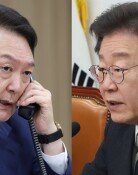N. Korea, China Enjoy Honeymoon Period in Bilateral Ties
N. Korea, China Enjoy Honeymoon Period in Bilateral Ties
Posted October. 13, 2010 11:16,
North Korea and China have grown closer since the sinking of a South Korean naval vessel in March under a honeymoon period in the wake of Kim Jong Uns apparent designation as the Norths successor.
Beijing took Pyongyangs side on the Cheonan sinking despite heavy criticism from the international community. China has also supported the third-generation power succession of the Norths ruling Kim family, urging Pyongyang to continue to build friendship for generations.
Top officials from both countries have conducted brisk exchanges in recent months through Kim Jong Ils second visit this year to China in late August, the convention of the Norths ruling Workers Party on Sept. 28, and the 65th anniversary of the party Sunday.
Chinas official Xinhua News Agency said Monday, Ties between China and (North Korea) are heading to its zenith again, reporting on the visit to the North by Zhou Yongkang, a member of China`s Politburo Standing Committee. Beijing called his trip an august journey and journey of friendship.
Zhou spoke to Kim Jong Il four times in his visit from Saturday to Monday, winning Pyongyangs enthusiastic welcome. He delivered Chinese President Hu Jintaos invitation to Kim Jong Il and Pyongyangs new leadership to Beijing.
Hu had earlier sent a congratulatory message to Kim Jong Il on the day of the Workers Party convention and 65th anniversary. He also sent a similar message to the Norths new leadership to a ranking Pyongyang official who visited Beijing to convey the results of the convention Oct. 2.
Overall, Hu has congratulated Kim Jong Il and the Norths new leadership four times in just 15 days.
Chinese Vice President Xi Jinping also attended a reception commemorating the inaugural convention of the Workers Party Saturday at the North Korean Embassy in Beijing. (North Korea) will further develop under its new leadership, he said.
Xi is considered most likely to succeed Hu. When Kim Jong Il visited China in May, Xi sat next to Hu and held talks with Kim Jong Il.
Likewise, three of the nine Politburo members in the Chinese Communist Party have taken action and made comments in support of Pyongyang over the past 15 days. This is quite different from the mood in 2005, when the North commemorated the 60th anniversary of its Workers Party.
At the time, none of Chinas Politburo members attended the ceremony in Pyongyang. Politburo member Zhia Qinglin only attended a ceremony at the North`s mission in Beijing, while Hu only sent a congratulatory message.
A source in Beijing said, There`ve been many occasions on the part of North Korea lately, but Beijing is apparently giving more consideration to Pyongyang than before in a certain way.
Hu has also repeatedly used the expression North Koreas new leadership, including mention of Kim Jong Un.
In the article Will the DPRK (Democratic Peoples Republic of Korea) Enter a New Era, the latest issue of the Chinese Foreign Ministry`s magazine World Knowledge said, After completing its generational shift, North Korea will continue to announce a string of important measures.
North Koreas economic hardships are caused by excessive military spending, but the cost is necessary because the country cannot guarantee its security, it said. If security is guaranteed and policy properly implemented, the North will see a sea of change within a generation.
Interestingly enough, North Korean First Vice Foreign Minister Kim Kye Gwan arrived in Beijing Tuesday for a visit.
mungchii@donga.com







